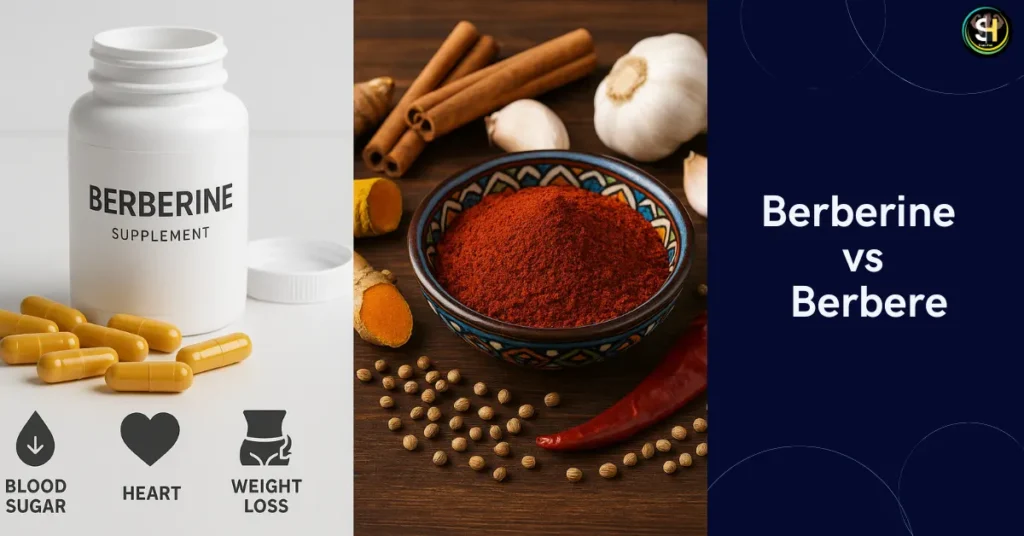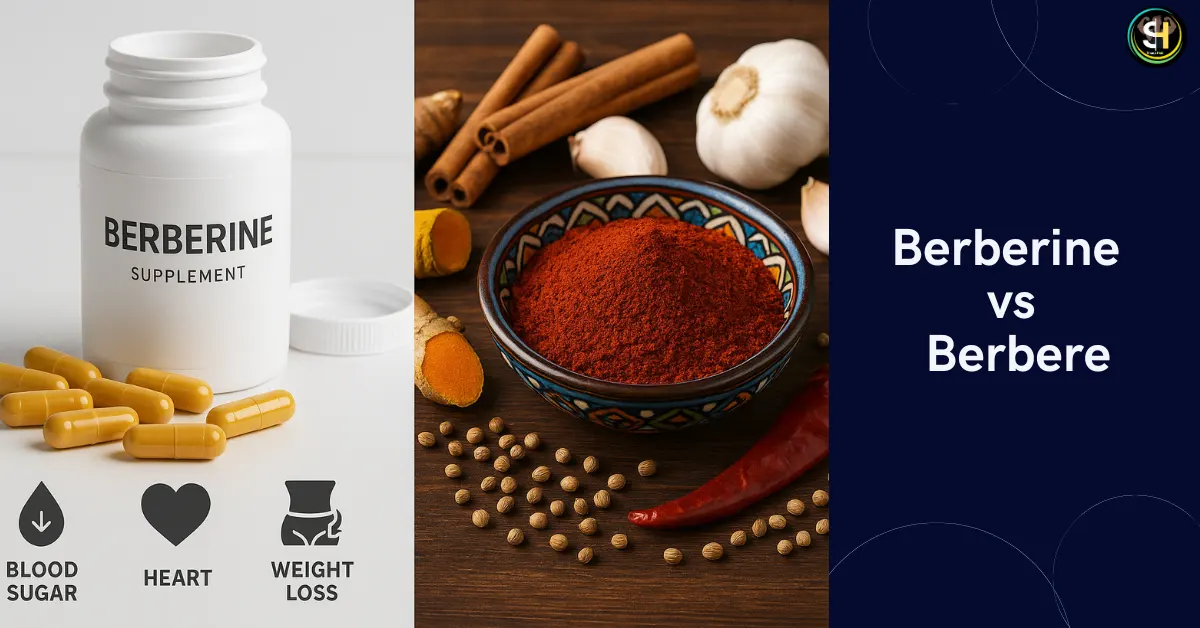
In the world of natural health and wellness, confusion can arise when two similar-sounding words represent entirely different substances. Such is the case with berberine and berbere. Despite the similarity in name, these are two distinct natural compounds—one is a plant alkaloid supplement with proven clinical benefits, and the other is a traditional Ethiopian spice blend with powerful anti-inflammatory and digestive properties.
Both have gained global attention for their roles in managing blood sugar, heart health, and weight control. But which one is more effective? Can they be used together? What does science say?
In this in-depth, we’ll explore:
- What is berberine?
- What is berbere?
- Nutritional and functional comparisons
- Evidence-based benefits
- Potential side effects
- Which one is right for your health goals
What Is Berberine?
Berberine is a bioactive alkaloid compound found in several plants, including Berberis, Coptis chinensis, and Hydrastis canadensis. It has been used in Traditional Chinese Medicine and Ayurveda for centuries to treat infections, digestive issues, and inflammatory conditions.
Modern science has uncovered berberine’s impressive effects on metabolic health, particularly in:
- Lowering blood sugar levels
- Improving insulin sensitivity
- Reducing cholesterol and triglycerides
- Supporting weight loss and fat regulation
- Improving gut microbiome balance
Berberine is typically taken as a dietary supplement in capsule or powder form, often at dosages between 500–1500 mg/day.
What Is Berbere?
Berbere, on the other hand, is a flavorful and spicy Ethiopian seasoning blend made from a combination of:
- Chili powder
- Ginger
- Garlic
- Turmeric
- Cinnamon
- Fenugreek
- Cloves
- Cardamom
- Cumin
- Allspice and others
It’s traditionally used in East African dishes like Doro Wat and Misir Wat, but it’s also gaining popularity in global kitchens due to its rich flavor and functional benefits.
Berbere is known for:
- Supporting digestion
- Boosting metabolism
- Reducing inflammation
- Enhancing antioxidant defenses
- Supporting blood sugar balance (indirectly)
Unlike berberine, berbere is a culinary spice blend, not a concentrated supplement. However, it offers cumulative health benefits when used consistently.
Key Differences Between Berberine and Berbere
| Feature | Berberine | Berbere |
| Type | Bioactive compound (alkaloid) | Culinary spice blend |
| Source | Barberry, Goldenseal, Coptis | Various ground spices |
| Use | Dietary supplement | Cooking ingredient |
| Blood Sugar Support | Clinically proven to reduce glucose levels | Indirect via insulin-sensitizing spices |
| Cholesterol Management | Lowers LDL, triglycerides, improves HDL | Contains cinnamon & garlic, beneficial for lipids |
| Weight Control | Supports fat loss and reduces hunger | Boosts metabolism via thermogenic spices |
| Anti-inflammatory | Strong systemic anti-inflammatory | Anti-inflammatory due to ginger, turmeric |
| Scientific Research | Backed by dozens of clinical trials | Backed by traditional use and early studies |
| Dosage | 500–1500 mg/day (in supplements) | Variable—used in teaspoons in food |
Health Benefits of Berberine: Backed by Clinical Science
1. Blood Sugar Control
Berberine is often compared to pharmaceutical drugs like metformin for its glucose-lowering effects.
- Mechanism: Activates AMPK (AMP-activated protein kinase), which regulates glucose metabolism and insulin signaling.
- Clinical Study: A 2012 meta-analysis in Metabolism showed that berberine was equally effective as metformin in reducing fasting blood glucose and HbA1c.
✅ May help manage Type 2 diabetes, prediabetes, and insulin resistance.
2. Cholesterol and Heart Health
Berberine improves lipid profiles by:
- Lowering LDL (“bad”) cholesterol
- Increasing HDL (“good”) cholesterol
- Reducing triglycerides
📌 A study published in the Journal of Clinical Endocrinology & Metabolism found that berberine reduced LDL by 21% and triglycerides by 35%.
3. Weight Loss and Fat Regulation
Berberine supports fat-burning and appetite suppression through:
- Hormonal modulation (leptin, insulin)
- Reduced fat cell formation (adipogenesis)
- Enhanced metabolism
🧪 A 12-week clinical trial in Phytomedicine found that obese participants taking 500 mg of berberine three times daily lost an average of 5 pounds and 3.6% body fat.
4. Gut Microbiome Support
Berberine acts as a natural antimicrobial, improving the balance of gut flora and reducing dysbiosis.
It has shown effectiveness in IBS, SIBO, and leaky gut by:
- Reducing pathogenic bacteria
- Enhancing short-chain fatty acid (SCFA) production
- Improving gut lining integrity
Health Benefits of Berbere: Traditional Wisdom Meets Modern Science
1. Improves Digestion
Thanks to garlic, ginger, cumin, and fenugreek, Berbere stimulates:
- Saliva and gastric enzyme secretion
- Bile production
- Gut motility
This promotes better nutrient absorption and reduces bloating.
2. Enhances Metabolism
Berbere contains capsaicin (from chili) and ginger, which are known thermogenic agents—they increase calorie burning and boost metabolism naturally.
These compounds:
- Support fat oxidation
- Raise body temperature slightly
- Improve insulin sensitivity
3. Fights Inflammation and Oxidative Stress
The anti-inflammatory synergy of turmeric (curcumin), ginger, cinnamon, and garlic helps:
- Reduce systemic inflammation
- Protect cells from oxidative damage
- Lower the risk of chronic diseases
This makes Berbere beneficial in preventing heart disease, arthritis, and neurodegenerative disorders.
4. Regulates Blood Sugar (Mild Support)
Spices like cinnamon, fenugreek, turmeric, and ginger are known for:
- Enhancing insulin sensitivity
- Slowing carbohydrate digestion
- Supporting glucose regulation
📌 While Berbere is not a direct glucose-lowering compound like berberine, its regular use can complement healthy blood sugar levels.
Can You Combine Berberine vs Berbere for Maximum Benefit?
Yes! In fact, combining berberine (supplement) with berbere (spice blend in cooking) can offer a dual-approach to metabolic health.
- Berberine works on a cellular level, enhancing insulin sensitivity and glucose uptake.
- Berbere provides culinary-level support, reducing inflammation, aiding digestion, and supporting metabolism over time.
Suggested Use:
- Berberine: 500 mg, 2–3 times daily before meals (consult your healthcare provider)
- Berbere: 1–2 tsp per day added to soups, stews, roasted vegetables, or eggs
Side Effects and Safety Considerations
Berberine
✅ Generally safe, but some may experience:
- GI upset (cramps, constipation, diarrhea)
- Headache or dizziness
- Interaction with medications like antibiotics, anticoagulants, and blood sugar drugs
🚫 Not recommended for pregnant or breastfeeding women without medical advice.
Berbere
✅ Safe in culinary amounts
🚫 May cause heartburn or irritation in people with sensitive stomachs or GERD due to chili or garlic
Who Should Use Berberine?
✅ People with:
- Prediabetes or Type 2 diabetes
- High cholesterol
- Obesity or metabolic syndrome
- PCOS (polycystic ovarian syndrome)
- Gut dysbiosis
Who Should Use Berbere?
✅ People who:
- Cook regularly and want flavorful, healthy meals
- Follow an anti-inflammatory or Mediterranean-style diet
- Are looking to improve digestion naturally
- Want to support metabolism with food-based solutions
The Final Verdict: Berberine vs. Berbere
| Health Goal | Winner |
| Blood Sugar Regulation | Berberine |
| Weight Management | Tie (Best when combined) |
| Cholesterol Control | Berberine |
| Digestive Support | Berbere |
| Anti-inflammatory Support | Tie |
| Culinary Use | Berbere |
| Supplement Potency | Berberine |
Conclusion
Berberine and Berbere are both exceptional natural compounds—but they serve different roles. Berberine is a potent supplement backed by rigorous clinical science for managing blood sugar, cholesterol, and weight. Berbere, meanwhile, is a flavorful spice blend that promotes digestive health, boosts metabolism, and enhances anti-inflammatory defenses through everyday meals.
Instead of choosing one over the other, consider integrating both into your health and wellness routine. Together, they offer a holistic, functional approach to metabolic health—rooted in both science and tradition.
Our Instagram
